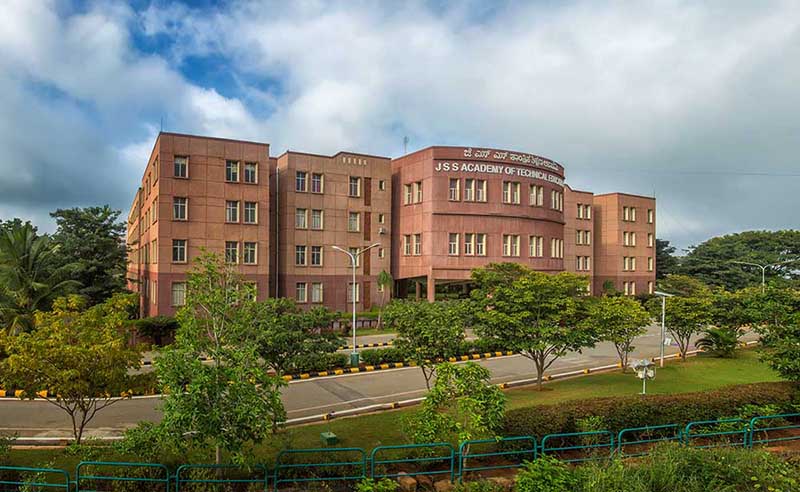
The Department of Robotics and Automation is a unique Engineering Program that deals with the design and development of automated systems combining Mechanical, Electronics, Instrumentation, Computer Science, Artificial Intelligence and Machine Learning in real time. This interdisciplinary program aims to develop proficiency in Mechanisms, Control Systems, Mechatronics, Dynamics and Embedded Systems. The graduates from this program will have the knowledge and skills to work in a broad variety of engineering careers in both the public and the private sectors such as automobiles, aerospace, Defence, pharmaceutical, food processing, chemical etc
The Department of Robotics and Automation is established in the year 2021. The curriculum of the program includes fundamentals as well as advanced courses that focus on imparting technical know-how to students, promoting their problem-solving skills and innovating new technologies. The Department is composed of well-qualified faculty with good retention.The regular activities of the Department includeMoUs with Industries, offering Internships for students at various Industries and Institutes, organizing Industrial visits, and conducting expert lectures and workshops for students. Students are encouraged to take part and exhibit their talents in building innovative Robot models at national and international level competitions.
| # | Program Educational Objectives:-The Graduates will be able to: |
|---|---|
| PEO - 1 | To prepare our graduates with a strong foundation for growth in professional career; pursue higher studies and research in Robotics & Automation |
| PEO - 2 | To equip our graduates with the skills in the fields of Robotics & Automation |
| PEO - 3 | To mould our graduates in the area of entrepreneurship, leadership, communication, team work, professional approach and ethics. |
| PEO - 4 | To empower our graduates to stimulate life-long learning and inculcate professional growth in the field of Robotics & Automation |
| # | Program Specific Outcomes :-The Graduates will be able to: |
|---|---|
| PSO-1 | Gain knowledge and acquire skills to develop automated systems for industrial /societal applications. |
| PSO-2 | Automate process /systems within realistic constraints. |
| # | Program Outcomes :-The Graduates will be able to: |
|---|---|
| PO-1 | Engineering Knowledge: Apply the knowledge of mathematics, science, engineering fundamentals, and an engineering specialization to the solution of complex engineering problems. |
| PO-2 | Problem analysis: Identify, formulate, review research literature, and analyze complex engineering problems reaching substantiated conclusions using first principles of mathematics, natural sciences, and engineering sciences. |
| PO-3 | Design/development of solutions: Design solutions for complex engineering problems and design system components or processes that meet the specified needs with appropriate consideration for the public health and safety, and the cultural, societal, and environmental considerations. |
| PO-4 | Conduct investigations of complex problems: Use research-based knowledge and research methods including design of experiments, analysis and interpretation of data, and synthesis of the information to provide valid conclusions. |
| PO-5 | Modern Tool Usage: Create, select, and apply appropriate techniques, resources, and modern engineering and IT tools including prediction and modeling to complex engineering activities with an understanding of the limitations. |
| PO-6 | The Engineer and Society: Apply reasoning informed by the contextual knowledge to assess societal, health, safety, legal and cultural issues and the consequent responsibilities relevant to the professional engineering practice. |
| PO-7 | Environment and Sustainability: Understand the impact of the professional engineering solutions in societal and environmental contexts, and demonstrate the knowledge of, and need for sustainable development. |
| PO-8 | Ethics: Apply ethical principles and commit to professional ethics and responsibilities and norms of the engineering practice. |
| PO-9 | Individual and Team Work: Function effectively as an individual, and as a member or leader in diverse teams, and in multidisciplinary settings. |
| PO-10 | Communication: Communicate effectively on complex engineering activities with the engineering community and with society at large, such as, being able to comprehend and write effective reports and design documentation, make effective presentations, and give and receive clear instructions. |
| PO-11 | Project Management and Finance: Demonstrate knowledge and understanding of the engineering and management principles and apply these to one’s own work, as a member and leader in a team, to manage projects and in multidisciplinary environments. |
| PO-12 | Life-long learning: Recognize the need for, and have the preparation and ability to engage in independent and life-long learning in the broadest context of technological change. |
| # | (Specialization) |
Yrs |
||||||
|---|---|---|---|---|---|---|---|---|
| 1 | Dr. RAMYA.M.V | B.E.,M.Tech.,Ph.D. (Embedded Systems and IoT ) |
Associate Professor & Head |
13-07-2022 | hodrobotics @jssateb.ac.in |
|||
| 2 | Mr. K S MAHESH | B.E.,M.Tech.,(Ph.D). (Maintenance Engineering) |
Assistant Professor |
13-09-2012 | ksmahesh @jssateb.ac.in |
| Mr. Niranjan N S | niranjanns@jssateb.ac.in | ||||
| Mrs. Ranjani S N | ranjanisn@jssateb.ac.in |
| Mr. Gurumurthy S S | gurumurthyss@jssateb.ac.in |
The curriculum of the program includes fundamentals as well as advanced courses that focus on imparting the technical know-how to the students, promote their problem-solving skills and innovation of new technologies. The theoretical and hands-on contents designed beyond the curriculum are going to help students acquire various skills necessary for designing and developing automated systems. Industrial training programs are designed to equip the students with hands on training in the fields of Robotics, Human Machine Interface, Machine vision, Machine Learning, Artificial Intelligence, Natural Language Processing, MATLAB and Python programming. Students are encouraged to take part and exhibit their talents in building innovative Robot models at national and international level competitions.
With an increasing demand for automation in almost every industry, specialisation in Robotics & Automation has created job opportunities in research and industrial needs. The graduates of this program may start their career as:
The program has initiated the discussions with the following reputed organizations for MoUs for various student support initiatives and R & D activities: